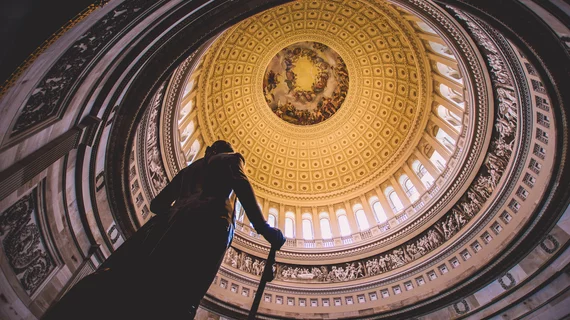MITA asks CMS for regulatory relief to mitigate pandemic’s toll on imaging
The Medical Imaging & Technology Alliance (MITA) Friday addressed a letter to the Centers for Medicare and Medicaid Services, recommending the federal agency take steps to fortify the imaging industry against the pandemic.
“The majority of available data suggests patients are not getting the imaging exams they need to properly diagnose and address a host of medical ailments,” Patrick Hope, executive director of MITA, said in a statement. “It is of timely importance that lawmakers and regulatory officials implement policies that address the current crisis and mitigate future public health consequences arising from the pandemic.”
Recent figures from data firm Quinsite suggest daily imaging volumes have dipped 50%, according to Radiology Business. And some subspecialties, such as mammography, experienced a nearly 79% drop in volume. Findings published in the New England Journal of Medicine echoed this, reporting a 40% drop in stroke imaging during the pandemic, a “very scary phenomenon,” authors of that study said.
Addressed to CMS Administrator Seema Verma, the letter touched on the need for policies to support infection control, reduce prior authorization requirements, and improve communication outreach to make sure patients don’t forgo imaging exams.
Address the immediate impact of COVID-19
Hope commended the initial work done by CMS, but wrote that it is “becoming clear” that the pandemic has changed how healthcare facilities use equipment and supplies.
He suggested the organization take steps to ensure its “rate-setting methodologies reflect the new realities of care.” Specifically, Hope implored CMS to study how resources required for these new standards will impact the bottom line of the entire care continuum, including imaging.
Mitigate future public health consequences stemming from the pandemic
According to the May 14 letter, MITA wants CMS to reduce burdensome prior authorization tasks under Medicare Advantage, via the emergency declaration, for at least one year past its expiration. This will ensure beneficiaries' access to imaging during and after the pandemic, Hope wrote.
He also requested that CMS notify patients and providers of the importance of rescheduling imaging exams and screenings.
Analyze policies that may amplify the effect of COVID-19
MITA cautioned against implementing policy changes that would result in payment cuts or administrative burdens to radiology, pointing to the federal agency’s decision to increase reimbursement for care-related Evaluation and Management (E/M) services. CMS should work with Congress to exempt or at least delay these changes, according to the letter.
A recent estimate from the American College of Radiology found this policy change will cost the imaging sector $770 million in its first year, and $10 billion over the next decade.
“We believe our recommendations will strengthen our healthcare infrastructure as it gets back on its feet in the months ahead,” Hope added in the statement. “These policies will help to ensure appropriate payment and incentivize a more normal experience for Medicare beneficiaries and providers.”

